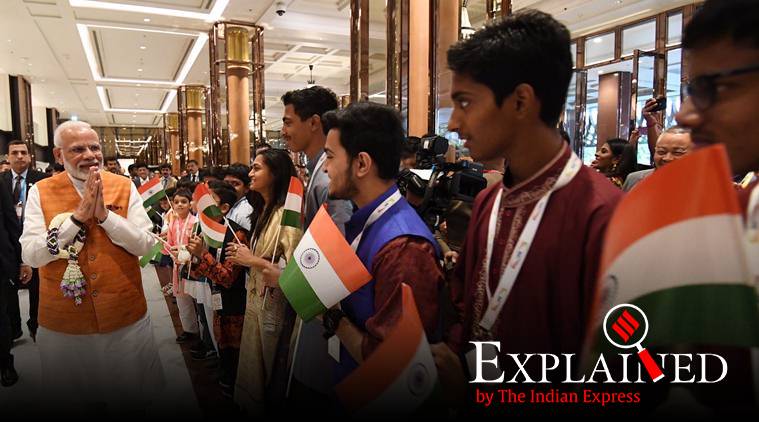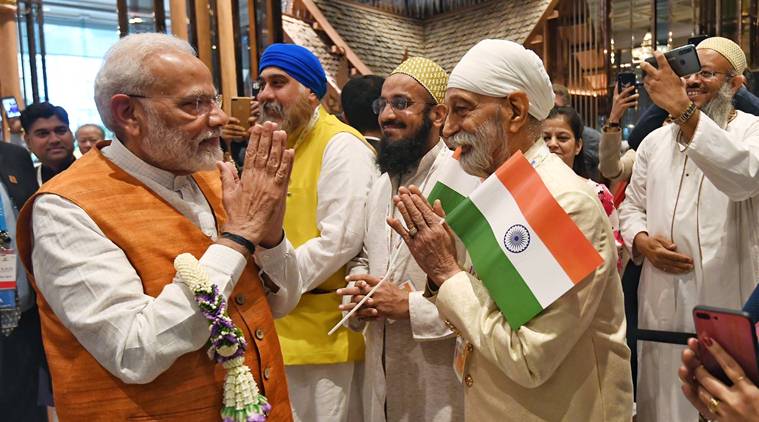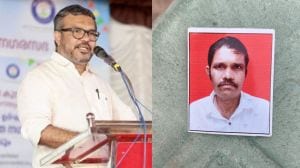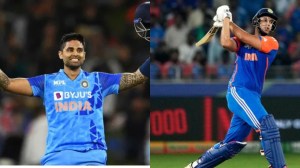Explained: What will Modi discuss in Thailand, what are the events
The 35th ASEAN and Related Summits are scheduled from Saturday to Monday in Muang Thong Thani, Bangkok.
 Modi is also expected to release a commemorative coin marking the 550th birth anniversary of Guru Nanak Dev. (Source: Twitter/MEA)
Modi is also expected to release a commemorative coin marking the 550th birth anniversary of Guru Nanak Dev. (Source: Twitter/MEA)
Prime Minister Narendra Modi is in Bangkok to attend the 16th ASEAN (Association of Southeast Asian Nations)-India Summit. While there, he is also scheduled to attend the 14th East Asia Summit and the third Summit meeting of nations negotiating the Regional Comprehensive Economic Partnership (RCEP) agreement, he is also expected to release a commemorative coin marking the 550th birth anniversary of Guru Nanak Dev.
“In Bangkok, there will be meetings with various world leaders to discuss important bilateral and global issues. India is eager to improve connectivity with @ASEAN nations. The East Asia Summit gives an opportunity to present our vision for the Indo-Pacific region,” Modi said in a tweet on Saturday.
35th ASEAN and Related Summits
The 35th ASEAN and Related Summits are scheduled from Saturday to Monday in Muang Thong Thani, Bangkok. Apart from the 10 ASEAN member states (Thailand, Malaysia, the Philippines, Cambodia, Brunei Darussalam, Myanmar, Vietnam, Laos, Singapore and Indonesia), the Summits will include Russia, Japan, China, India, Australia, South Korea, New Zealand and the US.
This year, leaders are expected to issue over 21 declarations including a Joint Statement on the Reaffirmation of the Commitment to Advancing the Rights of the Child in ASEAN and the Best Practices and Non-Binding Guidelines for Cooperative Activities on Marine Environmental Protection in the South China Sea, the Bangkok Post reported. On the sidelines of these summits, business-oriented summits such as the second edition of the Indo-Pacific Business Forum and the ASEAN Business and Investment Summit (ABIS) will take place.
 Members of the Indian community in Thailand welcome PM Modi. (Source: Twitter/MEA)
Members of the Indian community in Thailand welcome PM Modi. (Source: Twitter/MEA)
The Rohingya Association Thailand has urged the ASEAN members and the government of Myanmar to ensure the safety of the Rohingya who remain in Rakhine State and those who have fled. Meanwhile, ASEAN has asked the government of Myanmar to grant citizenship to all displaced Rohingya.
Issues on the table
All eyes will be on the RCEP deal, negotiations for which have been ongoing since 2012 when ASEAN leaders and six other countries (India, China, Japan, South Korea, Australia and New Zealand ) launched them during the 21st ASEAN Summit in Cambodia. If signed, the RCEP trade deal will lead to the creation of the biggest free-trade region in the world as these 16 nations are home to over 3.6 billion people, or half the world’s population.
In an interview published in the Bangkok Post on Saturday, Modi is quoted as saying, “This is because the ASEAN region is not just an important gateway to the Indian Ocean region, and not only because it is civilisationally very close to us. It is also because ASEAN is one of the most economically and politically dynamic regions of the world today. India wishes to see a strong, unified and prosperous ASEAN playing a central role in the emerging dynamic of the Indo-Pacific.” He added that engagement with ASEAN remained to be a “critical” element for India’s Act East Policy and strategy. To a question about some perceptions about India being reluctant to sign the RCEP deal, Modi said, “It needs to be recognised that opening the vast Indian market must be matched by openings in some areas where our businesses can also benefit.”
About India’s role in the regional security architecture, Modi told the Bangkok Post, “I enunciated the concept of SAGAR in 2015. It stands for Security And Growth for All in the Region. ‘Sagar’ in Hindi means sea. We seek to achieve this vision by enhancing mutual trust and expanding security cooperation.”
Other than RCEP, Modi is scheduled to co-chair the 16th ASEAN-India Summit with Thailand Prime Minister Prayut Chan-o-cha where India’s relation with the ASEAN countries will be discussed. Modi will also hold bilateral meetings with on the sidelines of the three summits.
Other leaders attending include the Prime Ministers of Russia, Japan, Australia, New Zealand and the president of the Republic of Korea. From the United States, the President’s special envoy will be attending. So will the Secretary General of the United Nations.
- 01
- 02
- 03
- 04
- 05






































